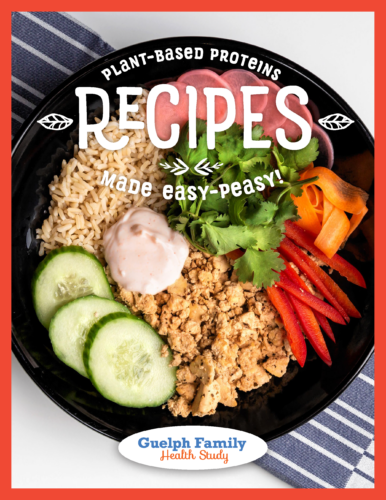
Looking to eat less meat in 2022? You’re not alone. Many Canadian families are interested in incorporating more plant-based proteins into their meals, but aren’t sure how to include legumes, nuts and soy in their diets.
Enter a new cookbook created by researchers from the University of Guelph’s Guelph Family Health Study (GFHS).
Plant-Based Proteins: Recipes Made Easy-Peasy is a new, free cookbook available for download in English and French on the GFHS website that integrates plant proteins into both new and well-loved recipes.
The 30 recipes in the e-book are designed to be great tasting, simple and quick to prepare for busy families with young children. Alongside each recipe are tips for buying, storing and cooking plant proteins, as well as info on what makes them a healthy source of nutrients.
“We designed this cookbook to be a resource for how to incorporate different types of plant-based proteins in recipes to make delicious, healthy meals,” said Dr. David Ma, a nutritional sciences professor in the College of Biological Science and director of the GFHS.
The GFHS collaborated with Health Canada on the cookbook and worked with the George Brown Food Innovation and Research Studio to design the recipes.
Not just for vegetarians or vegans

The cookbook is not only for vegetarians or vegans. Many of the recipes include meat but incorporate plant-based proteins as well, such as beef and bean burgers or chicken and bean quesadillas.
“We wanted a variety of recipes that would appeal to those who want to learn to eat healthier by adding planted-based sources of protein to their diets which are great sources of fibre, minerals and vitamins,” said Ma, a professor in the Department of Human Health and Nutritional Sciences (HHNS).
Canada’s new food guide recommends eating proteins from plant sources more often. It notes that shifting to more plant-based foods is linked to lower risks of heart disease, Type 2 diabetes and certain forms of cancer.
“We know that only a small portion of Canadians regularly eat legumes such as lentils, split peas, beans and soy,” said Ma. “Not only are plant-based proteins good for your health, they are good for the environment and good for the Canadian economy since Canada is the world’s largest producer of pulses, which are dry peas, lentils, chickpeas and beans.”
Recipes designed to be simple and quick to prepare for busy families

Funding and support for the project was provided by the Helderleigh Foundation, Health Canada, the Ontario Ministry of Agriculture, Food and Rural Affairs and Ontario Agri-Food Innovation Alliance, the Canadian Nutrition Society and the City of Guelph’s Our Food Future project.
This is the sixth cookbook developed by the GFHS team and, like the other books, is based on the study’s research activities. The GFHS team is also releasing a series of online videos that offer short cooking demonstrations of some of the team’s favourite recipes.
Ma said he hopes families will use the videos and recipes to find ways to cook together as a family.
“Our research has shown that even young children can help in the kitchen doing simple tasks like rinsing beans and washing and peeling vegetables,” said Ma. “Teaching children how to cook is an important life skill parents can pass on to children.”
Contact:
Dr. David Ma
davidma@uoguelph.ca
